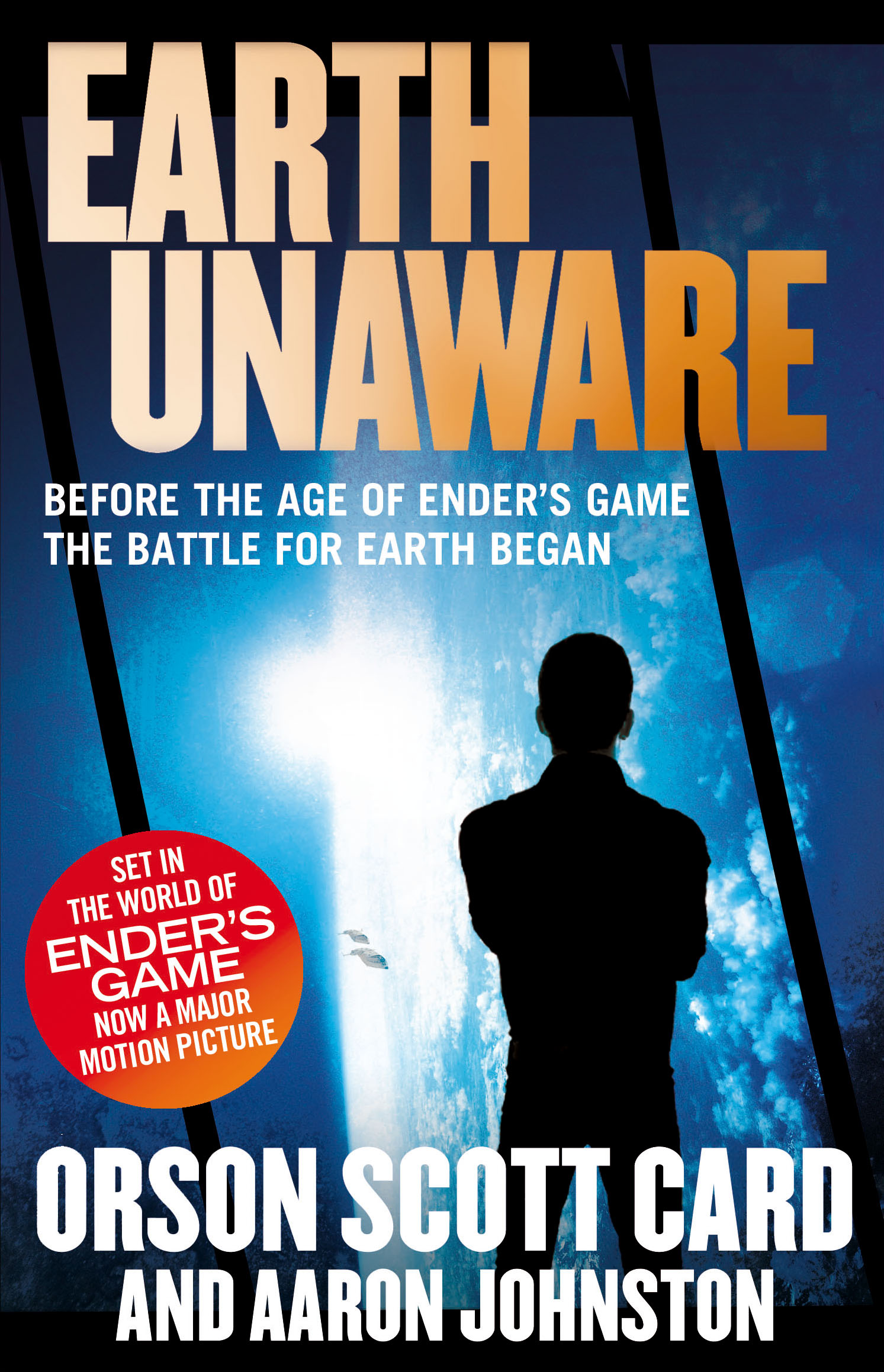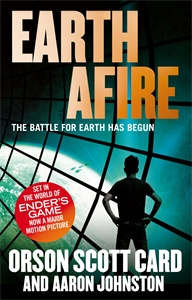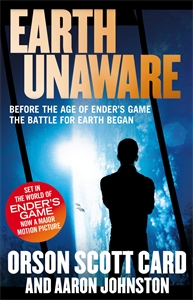On co-authoring a novel set in the world of ENDER’S GAME . . .
 Today sees the release of EARTH UNAWARE (UK|ANZ) and EARTH AFIRE (UK|ANZ), books 1 and 2 of The First Formic War, set 100 years before ENDER’S GAME.
Today sees the release of EARTH UNAWARE (UK|ANZ) and EARTH AFIRE (UK|ANZ), books 1 and 2 of The First Formic War, set 100 years before ENDER’S GAME.
Orson Scott Card co-authored these novels with Aaron Johnston – a bestselling author and associate producer on the upcoming Ender’s Game movie. To celebrate the release, we asked Aaron what it’s like to write within such a well-known and much loved world . . .
When Orson Scott Card asked me to coauthor the prequel novels to his science-fiction classic Ender’s Game, my first two thoughts were: (1) Wow, what an incredible honor, and (2) You better not screw this up, Johnston, or fans will hunt you down and toilet paper your house.
We fans can be a prickly lot. Especially when it comes to stories that hold special significance to us, as Ender’s Game does to millions of readers. I’ve read Ender’s Game more times than any other work of fiction, and whenever anyone asks me for a book recommendation, the first words out of my mouth are always, “Have you read Ender’s Game?”
For me, Ender’s Game was the first book I ever read wherein the characters didn’t feel like characters at all but rather like friends and kindred spirits. Bean, Dink, Shen, Valentine, Ender. They were all so believable and honest and distinct that when I stepped into their world, my own world melted away.
 I don’t presume to suggest that our books will have the same effect on readers as Ender’s Game does. Only Ender’s Game can produce the experience it provides. But I do hope that our novels will feel like they belong in the Ender universe. That was my goal from the beginning. “If we do this,” I told Scott, “I want it to feel like an Orson Scott Card novel.” And by that I mean: when fans read the book, I didn’t want them to distinguish between the parts I had written from the parts Scott had written. I wanted it to feel seamless.
I don’t presume to suggest that our books will have the same effect on readers as Ender’s Game does. Only Ender’s Game can produce the experience it provides. But I do hope that our novels will feel like they belong in the Ender universe. That was my goal from the beginning. “If we do this,” I told Scott, “I want it to feel like an Orson Scott Card novel.” And by that I mean: when fans read the book, I didn’t want them to distinguish between the parts I had written from the parts Scott had written. I wanted it to feel seamless.
That’s a lofty goal, I know. Only OSC can write like OSC, after all. But I felt as if we owed it to fans to provide a new and exciting adventure story that also felt like a member of the Ender universe.
In fact, it was so important to me that the books sounded and felt like other OSC novels that before I started writing each day, I would usually pick up an OSC book and read a chapter or two just to get my mind in a place that spoke in the voice and rhythm of Orson Scott Card. Scott has a gift for writing in third-person, limited point-of-view that allows for deep characterization without abandoning the pace. I’m not conceited enough to suggest that I do it as well as he does, but I certainly tried. The biggest compliment I have received thus far is when one fan called the series “classic Orson Scott Card.”
But of course this is a collaboration. And since Orson Scott Card rarely collaborates with other authors, fans naturally have a lot of questions. What follows are my answers to the questions I most often hear.
Aaron Johnston? Who the heck is that?
Um, that would be me. Hi. How you doing?
Was it intimidating working with a legend in the genre?
I’ve known Orson Scott Card for a long time. I first met him thirteen years ago when he directed me and my wife in a play in Greensboro, North Carolina. He and I have been collaborating ever since. We coauthored the novel Invasive Procedures. We’ve written comics for Marvel and EA Comics. We’ve developed screenplays, treatments, one-act plays. I don’t think of him as a legend. I think of him as a dear, personal friend who also happens to be my favorite author.
Is Mazer Rackham the hero of all three books?
The series has an ensemble cast. Scott and I made that decision early on. This wouldn’t be the story of one hero, as in Ender’s Game; it would be the story of many. Asteroid miners, soldiers, corporate miners, citizens. The discovery of a hostile alien race would change the world. Everyone would be affected. We wanted to create a sense of deep global impact.
And yes, Mazer Rackham is there as well. He plays a minor role in the first book, then he appears quite prominently in books two and three. His involvement was one of the most exciting aspects of this series for me. We get to see Mazer as a young, vibrant, special-forces soldier. That filled with me unadulterated fanboy glee.
How did you and OSC collaborate on the books?
Collaborators all do it differently. Scott and I have our own system. We developed the story together rather exhaustively through a series of story sessions, phone calls, instant-message conversations, and roughly nine billion emails. The initial ideas were mostly Scott’s. In those early sessions, I feverishly took notes while Scott shared what had been stewing in his mind for the past thirty years since first writing Ender’s Game. Characters, events, the science and logistics of space mining. This was a world of his invention, and he had been thinking about it for quite some time. I thought all of it was brilliant.
But that was only the first of many, many sessions. The bulk of the story we developed together, both of us expanding upon each other’s ideas. We considered the cultural practices of the various free-miner families. We discussed social structures, technology, family issues and relationships, military weaponry, ship design—everything we thought was necessary to create a believable economy in space.
And that was just the humans in the story. The Formics needed defining as well. How do they travel? What are their weapons? What’s their path through the solar system?
We even used a free astronomical software called Celestia to chart the Formic’s journey from the edges of the solar system along the ecliptic plane to Earth. We put a future date into the software, saw where celestial objects would be located at the time of the Formics’ arrival, then we mapped the story to be as astronomically correct as possible. Meaning, if the Formic ship nears an asteroid in the story, it’s because that asteroid really is there at that point in time.
When it finally came time for me to do my portion of the writing, I would write a chapter and send it to Scott, whereupon he would either make some revisions, give notes, or approve the chapter as is.
We stayed in contact throughout the writing process. We discussed the story almost daily. We invented new characters, threw out parts we agreed weren’t working, took the story in new directions, revised and tweaked, and stuck essentially to the master plan.
In a recent interview, OSC mentioned that The First Formic War is being considered as a TV series. Is that true?
Yes. True. But don’t preprogram your DVR just yet. There’s far more talking and considering going on in TV Land than there is actual production. Lots of shows are considered, but very few see the light of day. We’ll see.
Orson Scott Card is a producer on the Ender’s Game movie and you’re an associate producer. What can you tell us about the film?
I can tell you a great deal about the film, but then men and women with angry faces and law degrees would show up at my house and make me cry. So legally I can’t say much, other than that it thrills me to finally see this happening. We fans have waited a long time for this.
Will there be other prequel books to Ender’s Game beyond the First Formic War trilogy?
There were two wars before Ender Wiggin was born. The First Formic War and The Second Formic War. That leaves a lot of story left to tell.
EARTH UNAWARE (UK | ANZ) and EARTH AFIRE (UK | ANZ), books one and two of The First Formic War, are out now.


